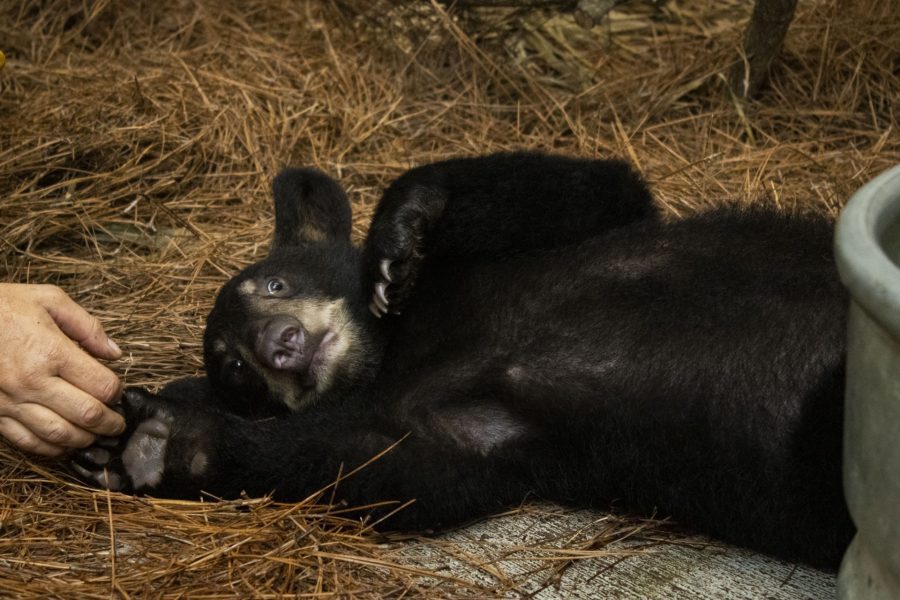

Welcome, little one!
Editor’s note: Our new bear cub has a name! Meet Betty.
Our Zoo is home to a new animal resident with a familiar story to Zoo fans: an orphaned bear cub.
This young female cub was found alone in April by the Florida Fish and Wildlife Conservation Commission Bear Research Program members while they were inspecting dens in the Florida Panther National Wildlife Refuge. This program aims to learn about the health and growth rate of the bear population, which relies on information about how many cubs are born and how many survive to become adult bears.
FWC continued to monitor this cub and found that her mother did not return to the den within 48 hours, which is a rare occurrence. Since the young bear hadn’t eaten in that timeframe, FWC made the decision to bring in the cub for human care.
Because of her young age, the cub needed to be hand-reared, so FWC reached out to our director of animal programs, Lauren Hinson, and the bear was brought to her. The cub, who does not have a name yet, was feeding from a bottle every 2½ hours at the time and kept behind the scenes.
“Brevard Zoo has a wealth of experience caring for orphaned wildlife, and we were particularly impressed with how Lauren was able to not only help [Florida black bear] Brody survive but thrive after being found at only 6-8 weeks old,” said Mike Orlando with FWC’s bear management program.
Lauren was the only staff member handling the cub to avoid as much human interaction as possible. By limiting her contact with humans, the hope was that she would keep her natural fear of humans, so the cub would be unlikely to approach a human in her natural range. Lauren also worked with her on learning to eat on her own so she wouldn’t associate people with getting food.
Our shared goal with FWC was to rehabilitate the cub so that she could be returned to her natural habitat. In May, she was taken to Homosassa Spring Wildlife State Park. There, park staff keep orphaned bear cubs who cannot survive on their own in an off-habitat space while they are cared for with minimal human contact. The goal is to ensure the cubs will not be conditioned to seek out food from people. In December, the cubs are released in an area with good bear habitat but very few other bears to give them the best chance to survive.
Unfortunately, this cub was deemed nonreleaseable because of her curiosity for people. The cub was taken in at a very young age and she still needed to be bottle-fed, Orlando said. Bottle feeding orphaned cubs requires an extensive amount of handling, and so it is extremely difficult to keep a cub from becoming attached to their caregiver.
“While we had hoped placing the cub in with another orphan cub that had not been bottle fed would help, the bottle-fed cub remained too used to people to be able to release back into the wild,” Orlando said.
Our Zoo has offered the cub a home. She will be the third bear who has been deemed nonreleaseable to come to live at our Zoo. Cheyenne was the first bear to live at our Zoo in 2018 after she became reliant on people for food. Brody, our first orphaned cub, arrived in 2020 after he was found weeks-old and without his mom.
She is currently quarantining in a behind-the-scenes habitat as we modify our bear habitats for her comfort. This includes adding perching, boxes, platforms and other fun items for her to play with and climb on in her new holding area and adding a shift tunnel to better maneuver all our bears to their different habitats.
She is now eating solid foods such as blueberries, worms, apples and pears along with some kibble. She is learning to play with our animal care team as she would her siblings and to trust that when they leave, they will return. Her animal care team is also working on teaching her to sit when asked, a skill that will help maneuver her for any future medical procedures.
The cub will be making visits to the main bear yard with her care team soon. She’ll also be introduced to Cheyenne and Brody once she gets a bit bigger. It’ll be a careful process to allow them to “howdy” or meet each other with a barrier in between them at first. Our older bears’ behavior and the cub’s size will determine when and who gets introduced to each other.
Keep an eye on our social media channels and blog for more news on our newest bear resident!
Brevard Zoo is an independent, not-for-profit organization that receives no recurring government funding for our operating costs. Your generous support enables us to continue to serve our community and continue our vital animal wellness, education and conservation programs.